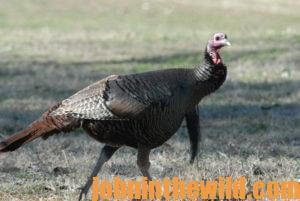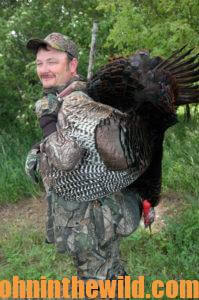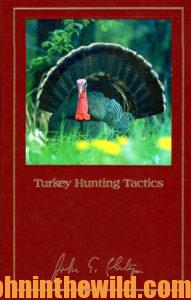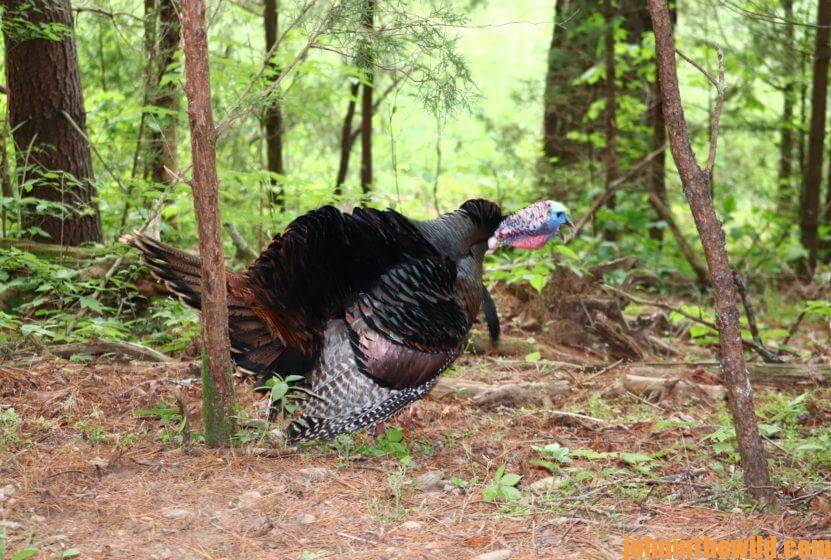Editor’s Note: Alex Rutledge
(https://www.facebook.com/pg/AmericanRootsOutdoors/about/?ref=page_internal) of Birch Tree, Missouri, a master turkey hunter and one of the nation’s top turkey callers, has over 40 years of turkey-hunting experience and teaching about turkeys at seminars. Rutledge knows how to call turkeys, as proved by the many titles he’s accumulated competing in turkey-calling contests over the years, including winning national, regional and state contests. Growing up on a farm and hunting turkeys and other game animals all his life, Rutledge has met several tough-to-hunt turkeys that he considers his professors in the sport of turkey hunting.
 I truly believe some turkeys are ventriloquists because they can throw their voices and fool you with their gobbles, especially if you’re hunting land with difficult terrain. One time I’d been on the road and had just arrived home on Saturday night. Because I went to church every Sunday morning, I only had a couple of hours to hunt before I had to get ready on this Sunday for church. Since I had to be at church at 10:45 am, I had to get home by 9:30 am.
I truly believe some turkeys are ventriloquists because they can throw their voices and fool you with their gobbles, especially if you’re hunting land with difficult terrain. One time I’d been on the road and had just arrived home on Saturday night. Because I went to church every Sunday morning, I only had a couple of hours to hunt before I had to get ready on this Sunday for church. Since I had to be at church at 10:45 am, I had to get home by 9:30 am.
Well, I found a turkey that Sunday that had hens with him. I got close to the bird several times that morning – within 50 yards – but never close enough to get a shot, which really made this land bad to hunt. I wanted to not take a shot more than 30-yards away. I was hunting in such open terrain, that once I set up, I couldn’t move. Rather than force the issue by taking a snap shot or by trying to call the turkey when I knew he wouldn’t be able to see a hen that would be calling to him, I just let the bird walk off with his hens.
To keep up with the bird’s location, I used owl calls or crow calls. However, I wouldn’t use any hen calls. About 8:30 a.m., the hens left the gobbler, which was above me on the hillside. Finally the gobbler walked on the other side of the hill away from me, which allowed me to move up the hill. However, I was running out of time as the gobbler went over the hill. I knew I had to be home by 9:30 am to take my family to church, and I was 15 or 20 minutes from the house.
While I was thinking about what I could do, the turkey gobbled, but his gobble sounded different, like he was inside a hill.
The Ozarks, where I was hunting, had numerous deep ditches, pockets and hollows in which a gobbler could move. I decided the tom probably was down in some kind of depression. Since I knew no other hunters would be hunting where I was, I began hen yelping and walking over the hill, straight at the gobbler. I’d never suggest that hunters use this tactic on public land, but since I was  on private land, I decided to sound like a hen walking toward that gobbler. I clucked, purred and used the toe of my boot to scratch the ground like a feeding hen. When I got to the lip of the hill, I spotted a big sinkhole where apparently the turkey was gobbling. Then I saw the gobbler not 15-yards away in full strut. When the turkey spotted me, he stuck his head straight up like a periscope because he didn’t understand what I was. I brought my gun up and got the shot before the turkey ever broke to run.
on private land, I decided to sound like a hen walking toward that gobbler. I clucked, purred and used the toe of my boot to scratch the ground like a feeding hen. When I got to the lip of the hill, I spotted a big sinkhole where apparently the turkey was gobbling. Then I saw the gobbler not 15-yards away in full strut. When the turkey spotted me, he stuck his head straight up like a periscope because he didn’t understand what I was. I brought my gun up and got the shot before the turkey ever broke to run.
From this Rough-Terrain Turkey, I learned that:
* if you’re running out of time, don’t think you can’t get a gobbler;
* when the tom’s gobble changes, try and determine why he sounds like he’s further away or closer to you, or why his gobble sounds are muffled;
* if a turkey sounds like he’s in a hole or in a ditch, don’t be afraid to move in really close on him, especially if you don’t think the turkey can see you;
* when you’re moving in on a turkey, try to sound like a turkey and not like a hunter; and
* if you go turkey hunting on Sunday, make sure you take your tom before you have to be at church.
 To learn more about turkey hunting, check out John E. Phillips’s book, “Turkey Hunting Tactics,” at http://amzn.to/WkbUE9 for Kindle and print versions. Click here for direct link to Audible.
To learn more about turkey hunting, check out John E. Phillips’s book, “Turkey Hunting Tactics,” at http://amzn.to/WkbUE9 for Kindle and print versions. Click here for direct link to Audible.
Tomorrow: What Are Alex Rutledge’s 10 Most-Frequently-Asked Seminar Questions










